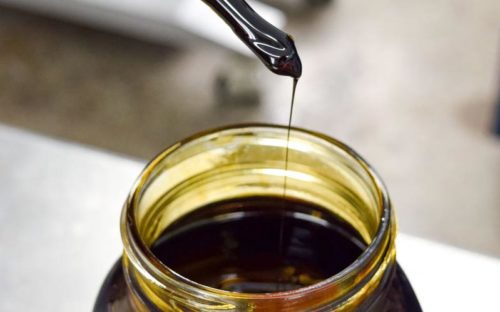CBG Distillate: Explain It. When Compared To Cannabidiol | Voluntate Shop
The majority of you who are acquainted with the CBD market has probably already heard of the cannabis compounds CBD and THC. They are merely a speck in the ocean, though. What if we informed you that marijuana plants contain dozens to hundreds of cannabinoid substances? Naturally, THC and CBD make up a sizable portion of those, but in today's piece, we'll focus on a rarer and more challenging to-extract compound called CBG or cannabigerol. Let's review some fundamentals about CBG Distillate and discuss what makes it unique and distinct from CBD and THC.
Known cannabis compounds
To begin with, the cannabis plant contains a variety of chemical compounds, just like all other vegetation. In general, substances found in weed are referred to as "cannabinoids". Terpenes are an intriguing illustration of such compounds (we told you about them in one of our previous blog articles). There are currently 113 known cannabinoids, with CBD and THC being the most well-known. The cannabis plant does not immediately produce THC (tetrahydrocannabinol) or CBD (cannabidiol). The plant must first produce cannabinoid compounds. Then, they are typically heated to activate them. The well-known CBD, THC, and less well-known CBG Distillate (cannabigerol) are only produced after this. Tetrahydrocannabinolic acid (THCA), cannabidiolic acid (CBDA), cannabichromenic acid (CBCA), and cannabigerol aa (CBGA) are the four cannabinoid acids (cannabigerolic acid).
While THCA breaks down to create THC and CBDA produces CBD, things get a little complicated with CBGA because this acidic form can either change into the acids of other compounds or produce four different compounds (CBG, CBD, CBC [cannabichromene], and THC). CBGA is frequently regarded as a forerunner to other cannabis chemical compounds because of this.
CBG described.
Another form of cannabinoid derived from the cannabis plant is cannabigerol (CBG). Young cannabis plants are used to make CBG because they have greater concentrations of the compound than mature plants do. The mother of all cannabis is a common moniker for cannabigerol. Beginning as CBG Distillate, other cannabinoids ultimately transform into other cannabinoids. We will go over these differences between CBG and other cannabinoids in the parts below. We'll be contrasting the "CBD-CBG" and "THC-CBG" combinations for the first two of them. You can Buy CBG Distillate at Voluntate Shop.
CBG versus CBD
Since neither CBD nor CBG is psychoactive, they cannot have the same "entourage impact" as THC. Additionally, this research has demonstrated that they can engage with related receptors in our endocannabinoid system. However, the potential advantages of the two substances appear to vary slightly because cannabigerol has a relatively low affinity for cannabinoid receptors and primarily works through indirect interactions with the endocannabinoid system. Additionally, CBG Distillate only makes up about 1% of the cannabis plant's total CBD content, which ranges from 20% to 25%. As a result, CBG preparations are extremely uncommon and challenging to make because they need numerous additional strains. Given its scarcity, CBG has been referred to as the "Rolls-Royce of cannabinoids," according to a number of sites.
CBG vs. Marijuana
Let's now contrast Cannabis with CBG. First off, the ability of tetrahydrocannabinol and cannabigerol to cause the alleged "entourage effect" varies. CBG Isolate won't make you high because it doesn't have any psychotropic effects as THC does. Cannabigerol is not a psychotropic, despite having a similar level of moderate psychoactivity to CBD. Unlike THC, CBD, and CBG have distinct effects on the brain and have no intoxicating properties.
Potential advantages of CBG Distillate
There hasn't been a lot of study on CBG because it is still a relatively new product on the market. However, the studies that we have discovered seem to have very positive results. Let's go over the important ones. The research that followed demonstrated that CBG can significantly reduce oxidative stress and inflammation. Another research confirms that CBG can interact with a variety of receptors that are involved in pain, inflammation, and heat sensitization. This research suggests that cannabigerol may be well tolerated.
The potential therapeutic benefits of CBG Distillate for inflammatory bowel disease were emphasized by an experimental animal study done in 2013. This study suggests that CBG may be beneficial for glaucoma treatment. The possible neuroprotective effects of CBG and other cannabinoids were also investigated in this study in mice with an experimental model of Huntington's disease. It was discovered that CBG Isolate could function as a neuroprotector, shielding brain nerve cells from harm. It might also lessen motor impairments and guard against 3-nitro propionic acid toxicity in striatal neurons. Another research demonstrated that the use of CBG Distillate in the treatment and prevention of colon cancer could be viewed from a translational viewpoint. You can Buy CBG Distillate at Voluntate Shop.
Despite the findings of the aforementioned studies, we kindly advise you to remember that additional study on CBG is required to confirm its advantages and disadvantages and to better comprehend how it interacts with the body.
Potential negative consequences of ingesting CBG
What about any negative impacts that consuming CBG might have? The negative impacts of cannabigerol have not been extensively studied. In actuality, the majority of people are not familiar with the cannabis cannabigerol. CBG's critical contribution to the production and maintenance of other cannabinoids may encourage further study of all of them.
Concluding remarks
Cannabis plants contain a huge variety of different compounds, and CBG is only a tiny portion of the whole. We looked at the fundamental details about CBG Isolate that you should be aware of in this piece. You can Buy CBG Distillate at Voluntate Shop.

Comments
Post a Comment